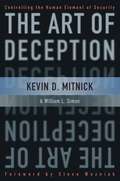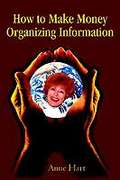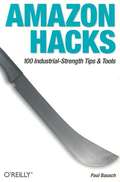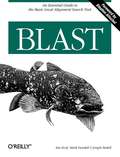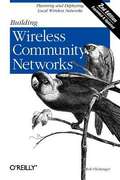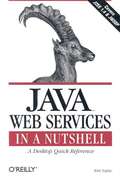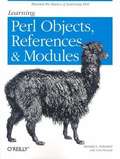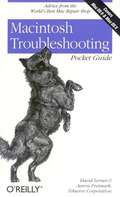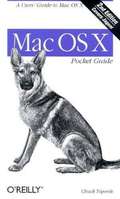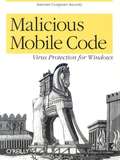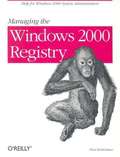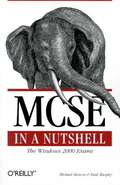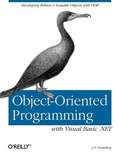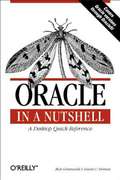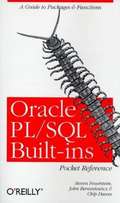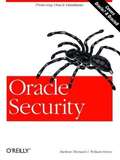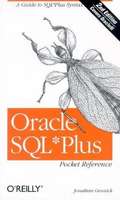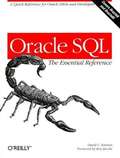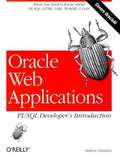- Table View
- List View
Linux Device Drivers, 2nd Edition
by Jonathan Corbet Alessandro RubiniThis practical guide is for anyone who wants to support computer peripherals under the Linux operating system. It shows step-by-step how to write a driver for character devices, block devices, and network interfaces, illustrating with examples you can compile and run. The second edition covers Kernel 2.4 and adds discussions of symmetric multiprocessing (SMP), Universal Serial Bus (USB), and some new platforms.
JXTATM in a Nutshell
by Li Gong Scott Oaks Bernard TraversatO'Reilly's pioneering reference is the first and last word on this powerful distributed computing technology. JXTA in a Nutshell delivers all the information you need to get started, including an overview of P2P distributed computing, an explanation of the JXTA Project's new platform, and ways that developers can become a part of the development effort. JXTA in a Nutshell introduces major concepts in a hands-on way by explaining them in context to the shell, and contains a complete reference to the JXTA app
Java Programming with Oracle JDBC
by Donald BalesLearn how to leverage JDBC, a key Java technology used to access relational data from Java programs, in an Oracle environment. Author Donald Bales begins by teaching you the mysteries of establishing database connections, and how to issue SQL queries and get results back. You'll move on to advanced topics such as streaming large objects, calling PL/SQL procedures, and working with Oracle9i's object-oriented features, then finish with a look at transactions, concurrency management, and performance.
JavaTM NIO
by Ron HitchensJava NIO explores the new I/O capabilities of version 1.4 in detail and shows you how to put these features to work to greatly improve the efficiency of the Java code you write. This compact volume examines the typical challenges that Java programmers face with I/O and shows you how to take advantage of the capabilities of the new I/O features. You'll learn how to put these tools to work using examples of common, real-world I/O problems and see how the new features have a direct impact on responsiveness, sc
Java Security, 2nd Edition
by Scott OaksThe second edition focuses on the platform features of Java that provide security--the class loader, bytecode verifier, and security manager--and recent additions to Java that enhance this security model: digital signatures, security providers, and the access controller. The book covers in depth the security model of Java 2, version 1.3, including the two new security APIs: JAAS and JSSE.
The Art of Deception: Controlling the Human Element of Security
by Kevin D. Mitnick William L. SimonInviting you into the complex mind of the hacker, Mitnick provides realistic scenarios of cons, swindles, and social engineering attacks on businesses--and the consequences. Focusing on the human factors involved with information security, Mitnick explains why all the firewalls and encryption protocols in the world will never be enough to stop a savvy grifter intent on rifling a database or an irate employee determined to crash a system. He illustrates just how susceptible even the most locked-down information systems are to a determined con artist impersonating an IRS agent or any other seemingly innocent character. Narrated from the points of view of both the attacker and the victim, The Art of Deception explores why each attack was so successful--and how it could have been averted--in an engaging and highly readable manner reminiscent of a true-crime novel.
Stealing Time: Steve Case, Jerry Levin, and the Collapse of AOL
by Alec KleinWhy the concept failed.Why the concept failed.
How To Make Money Organizing Information
by Anne HartHow to make money organizing information offers 29 businesses to open at home and/or online at very low cost for people who write, produce, package, research, retrieve, or organize any type of information for a variety of markets. Many of the writing and/or information related businesses or careers are especially suited to disabled people. For example, working with computer Braille or working with information for audio learning. Also helpful are careers re-packaging and organizing information for various professions and other specialty areas. Some businesses consist of using software to organize people on lists as for matching services for real estate, travel, and other services. A variety of careers for writers are discussed that will appeal to writers with disabilities as well as people who index books, for example with disabilities such as using software for the blind and editing using audio software for the visually impaired editor, writer, proofreader, or producer of learning materials and multimedia. For example, software allows blind Web designers and programmers to work with design. How to make money organizing information explains many careers--29 businesses, and writing techniques.
Amazon Hacks
by Paul BauschAmazon Hacks is a collection of real-world tips, tricks, and full-scale solutions to practical uses of Amazon.com and the Amazon Web Services API . The book offers a variety of interesting ways for power users to get the most out of Amazon and its community, for Associates to hone their recommendations for better linking and more referral fees, for researchers to mine the enormous amount of information in Amazon's data store, and for developers to integrate Amazon Web Services into their applications and se
BLAST
by Joseph Bedell Ian Korf Mark YandellBLAST (Basic Local Alignment Search Tool) is a set of similarity search programs that explore all of the available sequence databases for protein or DNA. BLAST is the only book completely devoted to this popular and important technology and offers biologists, computational biology students, and bioinformatics professionals a clear understanding of this program. This book shows you how to get specific answers with BLAST and how to use the software to interpret results. If you have an interest in sequence ana
Building Wireless Community Networks, Second Edition
by Rob FlickengerBuilding Wireless Community Networks is about getting people online using wireless network technology. The 802.11b standard (also known as WiFi) makes it possible to network towns, schools, neighborhoods, small business, and almost any kind of organization. All that's required is a willingness to cooperate and share resources. The first edition of this book helped thousands of people engage in community networking activities. This revised and expanded edition adds coverage on new network monitoring tools an
JavaTM Web Services in Nutshell
by Kim TopleyJava Web Services in a Nutshell is a high-speed tutorial and a quick reference for the technologies that Sun Microsystems is creating for implementing web services with Java. This book is a succinct introduction and handy reference to the Java/XML APIs, more commonly known as the JWSDP or "Java Web Services Development Pack." These APIs are taking the Java world by storm, as they are capable of handling everything from simple XML to SOAP to full ebXML vocabularies.
Learning Perl Objects, References & Modules
by Randal L. SchwartzLearning Perl Objects, References & Modules picks up where Learning Perl leaves off. This new book offers a gentle introduction to the world of references, object-oriented programming, and the use of Perl modules that form the backbone of any effective Perl program. Following the successful format of Learning Perl, each chapter in the book is designed to be small enough to be read in just an hour or two. Each chapter ends with a series of exercises to help you practice what you've learned with answers.
Macintosh Troubleshooting Pocket Guide
by David LernerThe Macintosh Troubleshooting Pocket Guide covers the most common user hardware and software trouble. It's not just a book for Mac OS X (although it includes tips for OS X and Jaguar), it's for anyone who owns a Mac of any type-- there are software tips going back as far as OS 6. This slim guide distills the answers to the urgent questions that Tekserve's employee's answer every week into a handy guide that fits in your back pocket or alongside your keyboard.
Mac OS X Pocket Guide, 2nd Edition
by Chuck ToporekConcise, easy to use, and thoroughly updated to cover Mac OS X 10.2, this new edition of the Mac OS X Pocket Guide introduces you to the fundamental concepts of Mac OS X. It also features a handy "Mac OS X Survival Guide," that shows Mac users what's changed from Mac OS 9, and helps Windows and Unix converts get acclimated to their new OS.
Malicious Mobile Code: Virus Protection for Windows
by Roger A. Grimes"Malicious mobile code" is a new term to describe all sorts of destructive programs: viruses, worms, trojans, and rogue Internet content. Malicious mobile code is more prevalent today than ever before, and both home users and system administrators need to be on the alert to protect their network or company against attacks. Malicious Mobile Code reveals what such code can and can't do and how to recognize, remove, and prevent it. Readers learn effective strategies, tips, and tricks for securing any system.
Managing the Windows 2000 Registry
by Paul RobichauxThe Windows 2000 Registry is the repository for all hardware, software, and application configuration settings. Managing the Windows 2000 Registry is the system administrator's guide to maintaining, monitoring, and updating the Registry database. A "must-have" for every 2000 system manager or administrator, it covers what the Registry is and where it lives on disk, available tools, Registry access from programs, and Registry content.
MCSE in a Nutshell: The Windows 2000 Exams
by Michael Moncur Paul MurphyThis single book is all that MCSE (Microsoft Certified Systems Engineer) candidates in the Windows 2000 track need to pass the required five MCSE core exams and two elective exams. A comprehensive study guide and detailed quick reference, MCSE in a Nutshell: The Windows 2000 Exams covers the four required exams and three optional ones, two of which can also fulfill the elective requirements.
Object-Oriented Programming with Visual Basic .NET
by J. P. HamiltonVisual Basic .NET is a language that facilitates object-oriented programming, but does not guarantee good code. That's where Object-Oriented Programming with Visual Basic .NET comes in. It will show you how to think about similarities in your application logic and how to design and create objects that maximize the benefit and power of .NET. Packed with examples that will guide you through every step, Object-Oriented Programming with Visual Basic .NET is for those with some programming experience.
Oracle in a Nutshell
by David C. Kreines Rick GreenwaldThe goal of Oracle in a Nutshell is to pull together the most essential information on Oracle architecture, syntax, and user interfaces. The content and format of this book, an admirable addition to O'Reilly's respected In-a-Nutshell line, combine to boil down vital Oracle commands, language constructs, parameters, and file formats in a succinct and highly accessible desktop reference.
Oracle PL/SQL Built-ins Pocket Reference
by Chip Dawes Steven Feuerstein John BeresniewiczThis companion quick reference to Steven Feuerstein's bestselling Oracle PL/SQL Programming and Oracle Built-in Packages will help you use Oracle's extensive set of built-in functions and packages, including those new to Oracle8. You'll learn how to call numeric, character, date, conversion, large object (LOB), and miscellaneous functions, as well as packages like DBMS_SQL and DBMS_OUTPUT.
Oracle Security
by William Heney Marlene TheriaultThis book covers the field of Oracle security from simple to complex. It describes basic RDBMS security features (e.g., passwords, profiles, roles, privileges, synonyms) and includes many practical strategies for securing an Oracle system, developing auditing and backup plans, and using the Oracle Enterprise Manager and Oracle Security Server. Also touches on advanced security features, such as encryption, Trusted Oracle, and Internet and Web protection.
Oracle SQL*Plus Pocket Reference, 2nd Edition
by Jonathan GennickThe new 2nd edition of our Oracle SQL*Plus Pocket Reference includes many new features for Oracle9 i (e.g., COALESCE function, searched CASE expressions, new table join syntax, partition operations, MERGE statement, and syntax changes in existing SQL*Plus statements such as ACCEPT, DESRIBE, HELP, and SET) It also adds sections on basic SQL (a much-requested feature): INSERT, DELETE, UPDATE, SELECT, and transaction management. The pocket reference size is especially appropriate for this particular subject, s
Oracle SQL: The Essential Reference
by David C. KreinesEverything Oracle developers and DBAs need to know about standard SQL (Structured Query Language) and Oracle's extensions to it is in this single, concise reference volume. Quick-reference chapters investigate basic SQL elements, Data Definition Language (DDL) and Data Manipulation Language (DML), SQL functions, PL/SQL, SQL*Plus, and Oracle SQL optimization and tuning. The book covers Oracle8 i, release 8.1.6.
Oracle Web Applications: PL/SQL Developer's Introduction
by Andrew OdewahnThis book is an easy-to-understand guide to building Oracle8i (Oracle's "Internet database") Web applications using a variety of tools -- PL/SQL, HTML, XML, WebDB, and Oracle Application Server (OAS). It also covers the packages in the PL/SQL toolkit and demonstrates several fully realized Web applications. This book provides the jump-start you need to extend relational concepts to Web content and to make the transition from traditional programming to the development of useful Web applications for Oracle8i.

